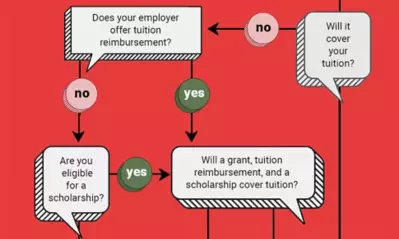How to save money while learning
This article was updated on May 20, 2025.

Written by Michael Feder

Reviewed by Chris Conway, Director of Financial Education Initiatives and Repayment Management

Saving money is crucial, especially when balancing school, work and your personal life. Whether you’re enrolling in college for the first time or returning to college after a break, establishing practical savings habits will help you manage your finances more efficiently. Here, we explore several strategies that may help you save money while pursuing your education.
How to save money and watch it grow over time
When thinking about how to save money, you don’t have to look at it through a lens of deprivation. For example, if you think of saving as “paying yourself first,” setting that money aside won’t feel like such a sacrifice.
What’s more, you don’t have to start off with a sacrificial amount. You can start with setting aside $10 or $20 a week and gradually increase your contributions as your financial situation improves. The key is to be disciplined and consistent, because even small savings grow over time. For example, saving $5 a day can add up to over $1,800 per year.
The power of compounding
Compounding is a powerful principle when it comes to how to save money. At its most basic, compound interest is the interest you earn on top of the interest you’ve already accrued on your initial deposit. The longer your money stays in an account, the more it grows.
There are various types of savings accounts, each with its own advantages:
- Traditional savings accounts: Known to be reliable but typically offer low interest rates.
- High-yield savings accounts: Often available at online banks at higher interest rates.
- Money market accounts: Offer higher interest rates and are like a hybrid between a checking and savings account. They provide the flexibility of check writing and debit card access but usually on a limited basis.
- Certificates of deposit (CDs): Offer higher interest rates but with fixed terms (6 months, 1 year, 5 years, etc.) that require you to lock in your money for a set period. Early withdrawals may incur penalties.
By understanding the types of savings accounts, combined with learning how to save money, you’ll be able to develop a strategy that best fits your needs and helps you grow your wealth over time.
Creating a sustainable budget
Many individuals feel like they’re living paycheck to paycheck. However, after creating a budget and paying your bills, you may realize you have more money left over than you thought. The key is to monitor where your money is going.
It’s easy to underestimate your spending and lose control of your finances when you don’t have a clear budget. Start by listing your regular monthly bills. What’s coming in and what’s going out? Whatever is left over should be allocated toward your financial goals.
Let’s dive into some strategies that can help you save even more:
The 50/30/20 rule
An easy way to build a sustainable savings plan is by following the 50/30/20 rule. This budgeting method allocates:
- 50% for needs (rent, utilities)
- 30% for wants (entertainment, dining out)
- 20% for savings or debt repayment
You can adjust these percentages depending on your specific financial situation, but this is a good starting point and can be a solid foundation for managing your finances while learning how to save money.
Build an emergency fund
One part of learning how to save money is building an emergency fund. This fund can be crucial for financial stability, because it’s intended to help cover unexpected expenses, such as car repairs or medical bills. According to the Federal Reserve, data show that “54 percent of U.S. adults have enough savings to cover three months of expenses if they lost their primary source of income.”
Experts suggest saving three to six months of living expenses. Aim for $100, then $500, and gradually work your way up. Even a small cushion can prevent you from going into debt when emergencies arise.
Automate your savings
If you’re still asking yourself, “How can I save money?,” it may be worthwhile to automate the process. Consider setting up automatic direct deposits from your paycheck to a separate savings account.
Another method? Try using apps that round up your purchases to the nearest dollar and transfer the difference to your savings account.
Reducing recurring monthly expenses
Subscription services can silently drain your savings. Review them regularly. By doing so, you can identify those you actually use, and cancel or pause those that you don’t.
Smart grocery shopping
Ordering takeout or dining out regularly can add up quickly over time. Meal prepping and cooking at home are two effective tactics for addressing how to save money.
Not only will cooking at home cut costs, but it also has the potential to improve your physical health and well-being. Additionally, consider buying in bulk the items you use frequently. This can help save money in the long run.
Coupons and discounts
Don’t forget about the power of coupons. Joining loyalty programs to earn rewards and taking advantage of discounts can further increase your savings. Coupon apps can help you find discounts on your purchases, and combining these with store sales can add up to significant savings.
Simple steps to cut energy costs
Many people don’t realize that even when electronics are turned off, power is being used. Unplugging devices when they are not in use is a simple way to save money and reduce energy consumption. Switching to LED light bulbs can also reduce your electricity bills over time. These small changes can make a big difference in your overall savings.
Overcoming barriers to saving
Looking for more ways to enhance your saving strategy? Consider the following.
Managing limited income
Many students, especially those balancing jobs, may struggle to save due to a limited income. It is not impossible to learn how to budget and save money on a limited income, but it can take longer to save and involve more sacrifices. As with any savings strategy, you need to develop a well-organized budget that tracks both income and expenses. This can help you identify areas where you can save. If time and energy allow, you might also consider taking on a side hustle to supplement your income and help build your savings.
Reducing high living expenses
Rent, utilities and transportation costs can eat up a significant portion of your budget. To save more, consider options such as shared housing or moving in with family temporarily to help reduce your living costs.
Simple tools to make it easier
Many students can find it beneficial to use tools that provide personalized insights into their spending habits and assist them with making better financial decisions. Budgeting apps exist for a variety of purposes. You can find apps to track your spending, for example, or explore high-yield savings accounts for better returns. Other online platforms can offer information and insights to improve your financial literacy. Explore those with established followings and a robust selection of informative articles.
Additionally, consider participating in webinars or workshops that concentrate on financial management. Many institutions and organizations, including University of Phoenix, provide low-cost or free programs that are specially designed to provide education resources to help better manage financial difficulties students face.
How to save money in the long term
Learning how to save money while pursuing your education doesn’t have to be overwhelming. By starting small, automating your savings and adopting smart spending habits, you can make progress toward financial stability and security. Remember, it’s a journey. Every step can bring you closer to your financial goals, no matter how small.
Get more insights and money-saving techniques through webinars hosted by Goalsetter and University of Phoenix.
You can also find more information on managing your finances while in school by exploring University of Phoenix financial literacy resources.
This article is not intended to serve as financial advice. All financial decisions, including investments, should be made carefully and potentially with the guidance of a financial planning professional.
Read more articles like this:

ABOUT THE AUTHOR
A graduate of Johns Hopkins University and its Writing Seminars program and winner of the Stephen A. Dixon Literary Prize, Michael Feder brings an eye for detail and a passion for research to every article he writes. His academic and professional background includes experience in marketing, content development, script writing and SEO. Today, he works as a multimedia specialist at University of Phoenix where he covers a variety of topics ranging from healthcare to IT.

ABOUT THE REVIEWER
As Director of Financial Education Initiatives and Repayment Management, Chris Conway works with departments across the University to provide resources that allow students to make more informed financial decisions. She is also an adjunct faculty member for the Everyday Finance and Economics course at the University, and she chairs the National Council of Higher Education Resources College Access and Success Committee. Conway is committed to helping college students make the right financial decisions that prevent future collection activity.
This article has been vetted by University of Phoenix's editorial advisory committee.
Read more about our editorial process.


